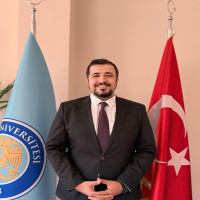Review
Research Article
Issue Editorial Board

Issue Reviewers




1987 yılında Ankara'da doğdu. Lisans eğitimini 2005-2009 yılları arasında Zonguldak Bülent Ecevit Üniversitesi İktisadi ve İdari Bilimler Fakültesi Maliye Bölümünde tamamladı. Akademik hayatına Aralık 2009'da Akdeniz Üniversitesi Sosyal Bilimler Enstitüsü Maliye Anabilim Dalında Araştırma Görevlisi olarak başladı. Daha sonra sırasıyla, Hatay Mustafa Kemal Üniversitesi İktisadi ve İdari Bilimler Fakültesi Maliye Bölümü Maliye Teorisi Anabilim Dalı ile Hacettepe Üniversitesi Sosyal Bilimler Enstitüsü Maliye Anabilim Dalında Araştırma Görevlisi olarak çalıştı. "Gelir Eşitsizliği ve Ekonomik Büyüme İlişkisi: Ampirik Bir İnceleme" başlıklı (bütünleşik) doktora teziyle Kasım 2019'da Hacettepe Üniversitesi Sosyal Bilimler Enstitüsü Maliye Anabilim Dalından doktor unvanı aldı. 2020-2022 Ocak döneminde Hatay Mustafa Kemal Üniversitesi İktisadi ve İdari Bilimler Fakültesi Maliye Bölümü Maliye Teorisi Anabilim Dalında Araştırma Görevlisi Doktor olarak çalıştıktan sonra, 26 Ocak 2022 tarihinde Kırşehir Ahi Evran Üniversitesi Sosyal Bilimler Meslek Yüksekokulu Muhasebe ve Vergi Uygulamaları programına Doktor Öğretim Üyesi olarak atandı. Hâlen bu pozisyonda çalışmakta olup 07 Eylül 2023 tarihinde Maliye bilim dalında Doçent unvanı aldı. Web of Science ve Scopus kapsamında yer alan indekslerde taranan dergilerde olmak üzere uluslararası ve ulusal hakemli dergilerde yayınlanmış makaleleri, ulusal ve uluslararası yayınevleri tarafından basılan kitaplarda kitap bölümleri, ulusal ve uluslararası toplantılarda sunulmuş bildirileri olup akademik çalışmalarına devam etmektedir.






 Web
Web
Financial Law


Dr. Hatice Cenger is a faculty member at the Faculty of Business Administration, Muğla Sıtkı Koçman University. Her research focuses on portfolio optimization, behavioral finance, utility theory, performance measurement, non-parametric econometric methods such as Data Envelopment Analysis (DEA), multi-criteria decision-making methods, and value-oriented portfolio models. She has published several articles and book chapters in national and international peer-reviewed journals.




Aim & Scope
International Journal of Social, Political and Financial Researches; It aims to contribute original studies in the field of social sciences to the literature.
It is a scientific, international peer-reviewed and open-access electronic journal that publishes original Turkish and English scientific articles on various subjects covering social, political and financial fields. At IJSPFR, all articles covering social, political and financial fields are taken into the evaluation process. IJSPFR has a wide range of topics.
Author Guidelines
International Journal of Social Political and Financial Researches Authorship Rules and Publication Policy
1. APA 7 should be used as the citation style in studies submitted to the International Journal of Social Political and Financial Research. See ANNEX-1 for APA 7 “Citation Guide”.
2. Studies sent to the International Journal of Social Political and Financial Research; It should cover areas such as finance, economics, business administration, political science and public administration, international relations, international trade, labor economics and industrial relations, finance and banking, health management, management and information systems, econometrics and financial econometrics.
3. Studies conducted in accordance with scientific research, publication ethics and writing rules must not have been published anywhere before. All responsibility in this regard belongs entirely to the author(s).
4. The journal does not request any fee from the authors, nor does it pay any royalty fees to the authors.
5. Only one article by an author is published in the same year (excluding special issues). Even if the author's second article sent to the journal in the same year is accepted, it will be queued for the issue to be published the following year.
6. Studies written in either Turkish or English are accepted for the journal.
7. Blind refereeing is essential in accordance with the quality and ethical principles of scientific studies to be published in the journal. The study, which is approved by the editor, is sent to at least two referees for evaluation. For the study to be accepted, both referees who evaluate the study must express a positive opinion. If one of the referees expresses a negative opinion, the study is sent to a third referee. If the third referee expresses a positive opinion, the study is accepted. Otherwise, the work will be rejected. Referees' correction requests must be fully met by the authors and delivered to the editor. However, due to the nature of science, authors may object to referees' correction requests. In this case, the authors have to show counter-evidence.
7. The copyright and publishing rights of the published works belong to the journal. For this reason, when submitting studies to the journal, a copyright transfer form is also requested from the authors. The Copyright Transfer Form must be signed by all authors. See ANNEX-2 for the “Copyright Transfer Form”.
8. Articles to be sent to the journal should not exceed 25 pages, including abstract, bibliography, references and tables.
9. For articles submitted to the journal, authors are requested to send a similarity report using a plagiarism scanning program (Intihalnet (Will be uploaded via Dergipark system), iThenticate, Turnitin). Articles of authors who do not submit this report will not be published. The upper limit for similarity reports is set at 20%, excluding bibliography (This condition is not required for publications derived from postgraduate theses, and at this point, the authority is exercised by the journal editor). Articles that are more similar than this ratio are rejected by the editorship, even if the process is completed.
10. In publications presented at scientific meetings, published in abstracts, or derived from postgraduate theses, the author must indicate this on the article cover page. The responsibility for any shortcomings in this regard lies with the author(s) and the journal cannot be held responsible.
11. Studies submitted to the journal must be prepared in accordance with the template in Microsoft Word (doc.) format. For “Template” see ANNEX-3. The journal's writing template includes all general text formatting, page margins, paragraph formatting, table and figure formatting, and heading formats. Since no fee is requested from the authors for the works sent to the journal, the authors must prepare and submit their works in accordance with the writing guide and template. Studies that are not prepared in accordance with the template will not be sent to the referees and will be rejected by the editor.
12. As stated in the journal template, Turkish and English abstracts should be between 100-200 words. There should be 3-5 keywords and 2-4 JEL codes at the end of the abstracts.
13. If the studies submitted to the journal are supported by an institution, this information should be stated by the author in the footnote on the first page.
14. For studies that do not require ethics committee permission, the form in ANNEX-4 must be filled out and uploaded to the system. For studies that require ethics committee permission, the Ethics Committee Permission Document must be uploaded to the system by the authors.
15. Authors should upload the referee response file to the system if a correction is suggested after the referee evaluations. The referee response file can be found in ANNEX-5.
16. Authors should upload the author contribution/conflict of interest declaration form to the system while uploading their articles. The author contribution/conflict of interest declaration form is in ANNEX-6.
Ethical Principles and Publication Policy
Editors' Responsibilities
The editor and field editors of the International Journal of Social, Political and Financial Research, in accordance with the “COPE Code of Conduct and Best Practice Guidelines for Journal Editors” and “COPE Best Practice Guidelines for Journal Editors” published as open access by the Committee on Publication Ethics (COPE). Must have the ethical duties and responsibilities listed below:
• To decide whether the articles submitted for publication comply with the journal's purpose and publication policies.
• To check that there is nothing degrading, insulting or in violation of copyright in the articles sent, and to make the necessary decision within the framework of legal legislation when necessary.
• To ensure the continuous development of the magazine and to ensure that its content and quality continue to increase.
• To ensure that any information about the articles sent to the journal is not disclosed by the editor to anyone other than the editorial board, referees and the journal owner.
• Not to allow anyone to use unpublished materials and other information and data in the texts submitted to the journal by the author(s) in their own work without the express and written permission of the author(s).
Responsibilities of referees
• If referees do not find the work assigned to them relevant to their field, feel inadequate in evaluating the article, or do not have the required time for evaluation, they should withdraw from the task.
• Referees should never give information about the article they receive to anyone other than the journal editor. The article should not be discussed in other environments and confidentiality should be maintained from the beginning to the end of the process.
• Referees must make their criticisms objectively, fairly and in accordance with scientific ethics. Referees should not direct any personal criticism towards the author of the article, should not make comments focused on the authors' ethnicity, gender or political philosophy, and should ensure that the blind referee process continues fairly to evaluate the texts.
• Referees must review the entire text in accordance with the publication rules, and if the study is similar to another previously published study beyond legal standards, they must notify the editor.
• Care should be taken to ensure that referees have no connection with the author. If a possible conflict of interest arises, arbitrators must withdraw from the arbitration process.
• Referees should contribute to the editors to make the texts submitted to the journal more qualified.
Responsibilities of Authors
All works submitted to USSMAD must be original. Author(s) must undertake that the text they submit has not been previously published in any journal or publication.
• The text must be written within scientific criteria and contain sufficient resources.
• Author(s) are obliged to carefully examine the journal publication rules and prepare their articles in accordance with these rules.
• The author(s) must make all corrections suggested by the editor or referee in a timely and meticulous manner.
• Author(s) must upload all information and documents requested by the journal editor to the system within the time given to them.
• If the requirements requested by the editor or referee are not fulfilled during the process, the article is deemed to be withdrawn by the author(s).
• In case of a possible problem or need, the author(s) must preserve the raw data that forms the basis of their articles until the appropriate time following the publication of the article.
CODE OF ETHICS
1. In the uploaded study sent by the author(s) to the International Journal of Social, Political and Financial Research, all ethical rules were complied with, and all sources used were cited in accordance with the spelling rules.
2. All individuals and institutions that contributed to the study are included in the study.
3. This is an original study, it has not been published anywhere before, it has not been sent for publication, it is not a study accepted for publication and put on hold, it will not be sent to another journal while the International Journal of Social, Political and Financial Research is in the publication process.
4. If the study is produced from a thesis or derived from a paper, this is stated as a footnote on the first page of the article.
5. All authors of the article have reviewed the final version of the article and allowed it to be uploaded to the journal.
6. There was no ethical violation against all subjects and subjects whose data were used in the study, no illegal methods were used during the research, all legal permissions were obtained for the study and ethical rules were followed. There is no criminal element or illegal expression in the work.
7. All information and documents regarding the evaluation process of the study have not been and will not be shared with third parties.
8. The publishing rights, financial rights, processing, reproduction, representation, printing, publication, distribution and all communication rights to the public, including transmission via the internet, of all articles sent to the journal and accepted for publication belong to the International Journal of Social, Political and Financial Researches.
9. All thoughts and suggestions in the articles are the sole responsibility of the author.
10. The responsibility for all lawsuits filed with the claim of copyright and right claims related to the studies belongs to the author (s) of the article.
11. In all matters not mentioned above regarding the suitability of the study in terms of scientific research and publication ethics, the provisions of the "Higher Education Institution Scientific Research and Publication Ethics Directive" (http://www.yok.gov.tr/web/guest/icerik/-/journal_content/56_INSTANCE_rEHF8BIsfYRx/10279/18187) have been followed, and in addition, the principles published by the Committee on Publication Ethics (COPE) have been adopted as open access for ethical duties and responsibilities in publication ethics.
12. International Journal of Social, Political and Financial Research adopts the principles of Tubitak Journal-Park-Academic Open Access System and "Budapest Open Access Movement" (http://www.budapestopenaccessinitiative.org/ list_signatures) within the scope of open access. According to these principles; "peer-reviewed scientific works can be freely accessed, read, downloaded, copied, distributed, printed, scanned, linked to full texts, indexed, transferred to software as data and used for any legal purpose through the internet without financial, legal and technical barriers. Authors and copyright holders agree that all users have free access".
13. Authors whose articles are accepted are deemed to have agreed to share the information contained in their work with reference to protect the copyright and to protect the rights of the journal under the Creative Commons Attribution License. Accordingly, the International Journal of Social, Political and Financial Research applies the Attribution-Non-Commercial-Non-Derivative 4.0 International Public License (CC BY-NC 4.0) for all articles to be published.
14. When uploading an article to the journal, please upload the "plagiarism report" related to the article to the system as an additional file. In this direction, please upload your plagiarism report (Turnitin, Ithenticate, intihal.net, etc.) as a pdf file as a separate file with your article in question. In the relevant report, the title of your article and the names and percentages of the authors must be visible.
The author(s) submitting an article to the International Journal of Social, Political and Financial Research are deemed to have explicitly and voluntarily committed to the above-mentioned ethical rules.
OTHER ISSUES RELATED TO PUBLICATION
1. In all articles submitted to our journal, under the title of "method", which is a basic requirement of scientific publications, the research model, population-sample information, data collection tool, data collection methods, validity and reliability studies, if any, should be included.
2. In review or analytical articles, information on how the sources reviewed in the article were reviewed or how the article was structured should be given. In studies that examine other studies or works such as meta-analysis and synthesis studies, the criteria by which these works were selected and how they were examined should be reported. If there are any ethical or copyright permissions etc. in the article, this should also be stated in the method section.
3. Only one article with a single name and two articles with more than one name by one author are published in the same year (excluding call for papers and special issues). Even if the author submits another article and the article is accepted, it will be queued for publication in an appropriate issue in the following year.
4. The journal does not accept referee suggestions. Blind refereeing is essential for the quality of scientific publications and ethical criteria.
5. If an author wishes to withdraw his/her article when all processes are completed and the article is ready for publication, no new work will be accepted from the same author in the following year.
6. Articles to be submitted for publication in our journal should be at least 3500 and at most 9000 words (including abstract and references).
For manuscripts that exceed the maximum word count, if the word count is based on a special reason, the author should write this part in detail. Manuscripts that do not meet these criteria are not sent to the referee and are rejected by the editor.
7. Manuscripts submitted to the journal must be on topics appropriate to the scope of our journal, and articles outside the scope of the journal will be rejected by the editor.
8. All manuscripts submitted to our journal should be placed in our journal template.
9. For the manuscripts sent to our journal for evaluation, no guarantee of number, referee, duration and publication can be given, and the publication conditions depend entirely on the completion of the referee process, the permission of the authorized board / commissions and the editor, and the publication date of the appropriate issue.
10. Our journal cannot publish more than a certain number of articles in each issue. Therefore, even the manuscripts that have completed all processes are waiting for the appropriate issues planned to be published and are published in the appropriate issue by sorting them first according to the date of the finalization of their processes and then according to the date of submission.
Ethical Permission Certificate
Studies that require ethics committee approval according to TR Index 2020 criteria should be uploaded in PDF format when submitting to our journal. Articles submitted in 2019 and previous years and all articles that do not require an ethics committee decision will include an ethical responsibility statement. As of 2020, authors are expected to upload this statement in PDF format when uploading the article to the system. In studies that require ethics committee approval, information about the permission (name of the committee, date and number) should be included in the method section and also on the first/last page of the article. In case reports, information on the signature of the informed consent form should be included in the article. "Ethics Committee Decision" must be obtained if the article to be submitted includes/will include studies such as surveys and interviews/interviews with any person/group/community, observation, computerized testing, video/film recording, audio recording, administration of alcohol, drugs or any other chemical substance to the participants, exposure to high levels of stimulation (such as light, sound), exposure to radioactive material, etc. Otherwise, articles will not be accepted.
USSMAD Publication Policy
1. It is published electronically twice a year (March - October). Special issues can be published in addition to the current issues with the decision of the Editorial Board and the Editor.
2. USSMAD is an open access journal.
3. The journal is published at www.ussmad-journal.com and is a free journal.
4. Manuscripts received by the journal are sent to 2 referees on the subject if they are found to be in accordance with the editorial principles of the journal after the first evaluation by the editor and the editorial board. If the rejection and acceptance conditions are equal, a 3rd referee is assigned.
5. During the referee evaluation process of the articles submitted to the journal, the identities of the authors and referees are concealed in all processes of the studies.
6. Authors should make the necessary corrections in line with the correction requests from the referees and editors and upload the corrected versions of their work in line with the referee suggestions to https://dergipark.org.tr/tr/journal/4023/submission/step/manuscript/new within 15 days at the latest.
7. Authors have the right to withdraw their manuscripts at any stage.
8. After the correction, if requested, the manuscripts are resubmitted to the referee, and after the referee evaluation, the relevant article is published with the approval of the journal management.
9. Authors who are considering submitting an article to the journal should carefully review all these rules.
Price Policy
International Journal of Social, Political and Financial Researches (IJSPFR) is open access; No fee is charged for the article evaluation process, access to articles or publication processes.

